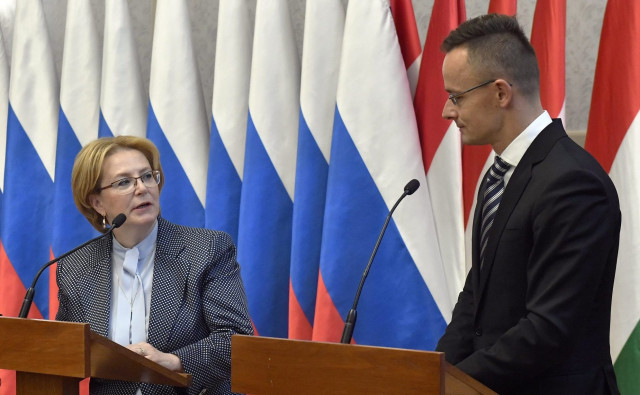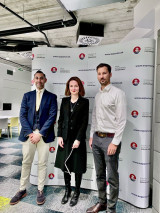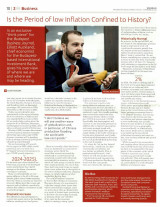Hungarian Minister of Foreign Affairs and Trade Péter Szijjártó: "The IIB headquarters relocation to Budapest serves to further reinforce Budapest’s international financial positions”
Source: Web Site of the Hungarian Government
“Hungarian-Russian relations have broken out of the recession caused by the international sanctions against Russia”, Minister of Foreign Affairs and Trade Péter Szijjártó declared on Thursday in Budapest at a press conference following the 11th session of the Hungarian-Russian Inter-Governmental Committee for Economic Cooperation.
Mr. Szijjártó pointed out that the states of Western Europe are still concluding much larger deals with Russia today, but relations between Budapest and Moscow are expanding dynamically in accordance with Hungarian interests.
“Following years of recession, trade flow between the two countries increased by 17 percent during the first 8 months of 2018, and following a three-year series of negotiations, an agreement has also been signed on the mutual acceptance of diplomas, training certificates and scientific degrees”, he added.
“At the session, the Committee also finalised the text of a social security agreement, which may now be signed at the next high-level meeting”, the Minister told reporters, adding that the Committee also discussed nuclear cooperation, and that thanks to Russian-Hungarian engineering development projects, the Paks Nuclear Power Plant could supply electricity to a further 80 thousand households.
Mr. Szijjártó announced that Hungary will be re-joining the International Economic Cooperation Bank, which has 400 million euros in capital, and that in early 2019 the headquarters of the International Investment Bank will be moving to Budapest from Moscow. “The latter serves to further reinforce Budapest’s international financial positions”, he added.
“The Committee also concluded an oncology cooperation agreement; a Central European oncology college will be established in Budapest in Hungarian-Russian cooperation, thanks to which the Hungarian capital could become a regional research centre”, Mr. Szijjártó announced.
From among the results achieved in Russia by Hungarian enterprises, he highlighted the fact that investments on the part of Hungarian oil company MOL have exceeded 1.3 billion euros and it is in the process of extracting 5800 barrels of oil in cooperation with its Turkish partner, in addition to which a host of Hungarian agricultural technologies are also gaining popularity in Russia, and a Hungarian-Russian consortium has won the tender to supply over 1 billion euros worth of railway machinery to Egypt.
Mr. Szijjártó declared that in accordance with international commitments and while maintaining European unity, Hungary regards Russia as an important partner, the two countries base their cooperation on mutual respect, and are supporting the expansion of inter-business relations by providing the most favourable conditions possible. He pointed out that Hungary has lost around 7 billion euros in exports as a result of the sanctions imposed against Russia, but that this is partly being counterbalanced by the activities of Hungarian enterprises in Russia.
The Russian Federation’s Energy Minister promised the continuation of cooperation to enable the further expansion of investment and trade between the two countries.
“Russia remains a dependable source of energy and energy-related partner, while oncological cooperation further reinforces our traditionally close healthcare relations”, the Committee’s Russian Co-Chair, Veronika Skvortsóva added.
She also said that a new working group will be established to reinforce Hungarian-Russian industrial cooperation, and that the body’s activities will extend to the manufacturing of helicopters, ships and agricultural machinery.
Following the meeting, an inter-governmental agreement was signed on the mutual acceptance of diplomas, training certificates and scientific degrees. The next session of the Hungarian-Russian Inter-Governmental Committee for Economic Cooperation will be held in Moscow in 2019.
(MTI)


